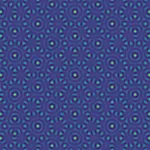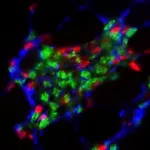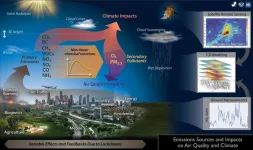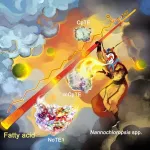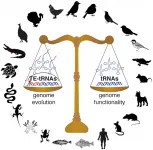New research provides insight into COVID-19 vaccine reluctancy among social media users
2021-04-14
(Press-News.org) New research has found that the most reliable indicators of willingness to be vaccinated against SARS-CoV-2, the virus that causes COVID-19, are rejection of conspiracy suspicions about COVID-19 and a positive attitude towards vaccines in general. The study by King's College London and the University of Bristol is published in the leading peer-reviewed journal Psychological Medicine.
The researchers' analysis was based on a large representative sample survey carried out in November-December 2020. They looked at a range of factors that previous studies had found to be related to hesitancy about getting vaccinated against the coronavirus and found that:
Women, young people, less-educated people, and members of other than white ethnic groups are more hesitant about getting vaccinated
People who get their information about COVID-19 from social media are more hesitant about getting vaccinated
However, the researchers also found that many of these differences can be explained by people's attitudes towards vaccines in general and also by whether or not they suspect that there has been a conspiracy or cover-up connected with COVID -19. In particular, they found that:
Vaccine hesitancy among people who get their information about COVID-19 from social media is completely accounted for by more negative vaccine attitudes and stronger conspiracy suspicions
Vaccine hesitancy among members of other than white ethnic groups and members of low-income households is almost completely accounted for by more negative vaccine attitudes and stronger conspiracy suspicions
Among those who have negative views of vaccines or who suspect that COVID-19 conspiracy theories may be true, more highly educated people appear to be more vaccine hesitant than less highly educated people
On the other hand, the researchers found that greater vaccine hesitancy among women and young people is not explained by conspiracy suspicions or by attitudes to vaccines in general.
Dr Daniel Allington, lead author of the article and Senior Lecturer in Social and Cultural Artificial Intelligence at King's College London, said:
"These findings provide a powerful insight into why heavy users of social media appear to be less confident about being vaccinated against coronavirus: they tend to have more negative attitudes to vaccines in general and they are more likely to suspect that conspiracy theories about the pandemic may be true."
Dr Siobhan McAndrew, principal investigator of the research project and Senior Lecturer in Quantitative Social Science at the University of Bristol, added: "This study gives insight into the connections between fundamental characteristics such as ethnicity and education, and attitudes to vaccination against coronavirus. We have found that conspiracist suspicions and attitudes to vaccines in general form part of the connection - attitudes which likely preceded the current pandemic. The question for policy-makers is how to restore fundamental trust over the long-term, in the interests of public health."
Dr Vivienne Moxham-Hall, Research Associate at the Policy Institute at King's College London with a background in immunology and health policy, explained: "These findings can inform government and public health organisation's communication about the coronavirus vaccine. In order to increase vaccine compliance, communication strategies need to account for the polarising nature of conspiracy theories by providing clear advice to those who may be unsure about vaccine safety and integrity."
INFORMATION:
ELSE PRESS RELEASES FROM THIS DATE:
2021-04-14
Mathematicians and engineers at the University of Utah have teamed up to show how ultrasound waves can organize carbon particles in water into a sort of pattern that never repeats. The results, they say, could result in materials called "quasicrystals" with custom magnetic or electrical properties.
The research is published in Physical Review Letters.
"Quasicrystals are interesting to study because they have properties that crystals do not have," says Fernando Guevara Vasquez, associate professor of mathematics. "They have been shown to be stiffer than similar periodic or disordered materials. They can also conduct electricity, ...
2021-04-14
UNIVERSITY PARK, Pa. -- Eating red meat may have a bad reputation for being bad for the heart, but new research found that lean beef may have a place in healthy diets, after all.
In a randomized controlled study, researchers found that a Mediterranean diet combined with small portions of lean beef helped lower risk factors for developing heart disease, such as LDL cholesterol.
Jennifer Fleming, assistant teaching professor of nutrition at Penn State, said the study suggests that healthy diets can include a wide variety of foods, such as red meat, and still be heart friendly.
"When you create a healthy diet built on fruits, vegetables, and other plant-based foods, it leaves room for moderate amounts of other foods like lean beef," Fleming said. "There are still ...
2021-04-14
Irvine, CA - April 14, 2021 - A new study, led by the University of California, Irvine (UCI), reveals how chronic inflammation promotes muscle fibrosis, which could inform the development of new therapies for patients suffering from Duchenne muscular dystrophy (DMD), a fatal muscle disease.
Titled, "A Stromal Progenitor and ILC2 Niche Promotes Muscle Eosinophilia and Fibrosis-Associated Gene Expression," the study was published today in Cell Reports.
Chronic inflammation is a major pathological process contributing to the progression and severity of several degenerative disorders, including Duchenne muscular dystrophy (DMD). Studies directed at establishing a causal link between muscular ...
2021-04-14
What are scientists passionate about? What do they actually do, and why does it matter? Answering questions like these is often part of public outreach efforts that, through demystifying the world of science for non-scientists, can increase appreciation for science and boost support for important research initiatives. Outreach can also make the sciences attractive and accessible to a broader diversity of people, who, in turn, can bring new ideas and perspectives.
"Science is having challenges in terms of getting the general public to support it and ...
2021-04-14
BOSTON - The anti-diabetic drug phenformin may prompt stronger cancer-fighting activities than its sister compound metformin, a finding that could have major implications for current and future clinical trials investigating both agents for their anti-cancer potential, according to researchers at Massachusetts General Hospital (MGH). In a review article in Trends in Cancer, the team presented evidence that immunotherapies such as immune checkpoint inhibitors (which enable T cells to attack and kill cancer cells) in combination with phenformin may also be a promising way to repurpose this diabetic drug as an anti-cancer ...
2021-04-14
One consequence of the coronavirus pandemic has been global restrictions on mobility. This, in turn, has had an effect on pollution levels in the atmosphere. Researchers from across the world are using this unique opportunity to take measurements, collect data, and publish studies. An international team led by Forschungszentrum Jülich's Institute of Climate and Energy Research - Troposphere has now published a comprehensive review providing an overview of results up to September 2020. The study also has its own dedicated website, where additional measurement data can be added to supplement and refine existing research results. At the same time, this collection of data allows scientifically substantiated predictions to be made about the ...
2021-04-14
By combining the 'chassis' of an oil-producing microalgae with genes from a Cuphea plant, scientists from the Single-Cell Center, Qingdao Institute of BioEnergy and Bioprocess Technology (QIBEBT) of the Chinese Academy of Sciences (CAS), can turn the algae into a microbial cell factory that can produce various oils with different properties.
The study was published in Metabolic Engineering on April 3.
Oils are composed of fatty acids, and fatty acids are composed in part of chains of carbon atoms. The length of these carbon chains can impact the physical properties of the fatty acid and thus the ...
2021-04-14
While people may expect suicide rates to rise during a worldwide crisis such as the COVID-19 pandemic, a University of Michigan study suggests the onset of the pandemic and state of emergency executive orders likely did not increase suicide-related behavior in the early months of the outbreak.
The report, led by U-M researchers Rachel Bergmans and Peter Larson, found that emergency room visits related to suicide attempt and self-harm decreased by 40% during the first eight months of Michigan's lockdown. Their results are published in the Journal of Epidemiology and Community Health.
The study compared emergency room reports of suicide attempt and intentional self-harm at a hospital in Michigan's Washtenaw County during the first 8 months of the ...
2021-04-14
The COVID-19 pandemic has cast a harsh light on the urgent need for quick and easy techniques to sanitize and disinfect everyday high-touch objects such as doorknobs, pens, pencils, and personal protective gear worn to keep infections from spreading. Now scientists at the U.S. Department of Energy's (DOE) Princeton Plasma Physics Laboratory and the New Jersey Institute of Technology (NJIT) have demonstrated the first flexible, hand-held, device based on low-temperature plasma -- a gas that consists of atoms, molecules, and free-floating electrons ...
2021-04-14
Birds have been shaped by evolution in many ways that have made them distinct from their vertebrate cousins. Over millions of years of evolution, our feathered friends have taken to the skies, accompanied by unique changes to their skeleton, musculature, respiration, and even reproductive systems. Recent genomic analyses have identified another unique aspect of the avian lineage: streamlined genomes. Although bird genomes contain roughly the same number of protein-coding genes as other vertebrates, their genomes are smaller, containing less noncoding DNA. Scientists are still exploring the potential consequences of this genome reduction on bird biology. In a new ...
LAST 30 PRESS RELEASES:
[Press-News.org] New research provides insight into COVID-19 vaccine reluctancy among social media users
